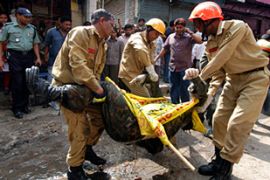Bodies unearthed after Dhaka mutiny
Officers’ corpses found in mass graves after two-day revolt by guards in Bangladesh.

‘Cold-blooded murder’
Syed M Kamruzzaman, an army officer who managed to escape the guards holding him, told the AFP news agency: “They hurled abuse at us and gunned down whoever they wanted. I was shot at seven times and was lucky to get out alive.
| In video |
|
|
“It was cold-blooded murder.”
More than 230 guards are reported to have been arrested in Dhaka and 68 more near the town of Savar after nearly 2,000 guards opened fire on their officers and seized control of the BDR base.
Haque said: “Government officers often go on strike about pay conditions here, but to kill your superior is quite unusual. The government is asking who is behind this, and is it solely about pay?
| In depth |
|
|
“Sheikh Hasina Wajed, the prime minister, had [originally] said the mutineers would be forgiven, but that now looks very unlikely – the attacks have been so brutal.”
Imtiaz Ahmed, a political analyst from Dhaka university, told Al Jazeera: “Initially there was some support for the Bangladesh Rifles (BDR), especially on the issue of grievances, but as the killings came to light and dead bodies are being found, there seems to be almost a turnaround.
“Support for the BDR has vanished absolutely. People are shocked at what they’re seeing.”
‘No right to kill’
Checkpoints have been set up across the country and ferries were being searched for fleeing mutineers.
The guards surrendered on Thursday after Sheikh Hasina sent tanks and troops into the streets of Dhaka and threatened to put down the mutiny by force.
 |
| Relatives of missing officers gathered outside the compound [Reuters] |
Hasina had offered the mutineers an amnesty and agreed to look into their demands, but later said the offer would not apply to those who carried out any killings, adding: “No one has the right to kill anyone.”
Manzoor Hasan, the director of BRAC University’s Institute of Governance Studies in Dhaka, said the mutiny had taken the country and Hasina by surprise.
“It was a bit of a baptism by fire for her. It was a critical test, but I think in the end she tackled it competently,” he said.
The violence is the first major crisis facing the prime minister since she was elected in late December, when Bangladesh returned to democracy after nearly two years of army-backed emergency rule.
Police chiefs across Bandladesh said BDR members had revolted in 15 border districts.
Guards within the BDR have opposed being led by army officers, saying they want commanders to be drawn from their own ranks.
The BDR’s main task is to guard the country’s borders, but it often supports the army and police.


